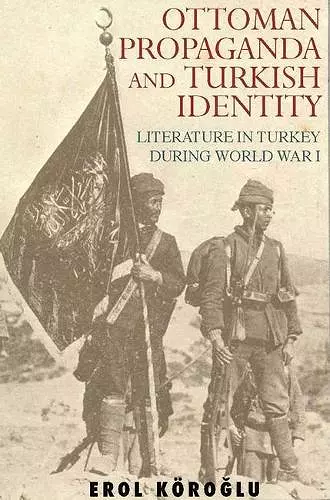Ottoman Propaganda and Turkish Identity
Literature in Turkey During World War I
Format:Hardback
Publisher:Bloomsbury Publishing PLC
Published:21st Jul '07
Currently unavailable, and unfortunately no date known when it will be back

The Great War was the first example of a total war in history, reflected in the cultures and literatures of Europe in the shape of propaganda. What began as civic patriotism developed into a weapon of war, programmed and organized by the state to devastating effect. In almost all countries, writers of different ideological hues were ready to undertake the job of representing the war, in accordance with the state's guidance. War propaganda in the Ottoman Empire, the most anachronistic belligerent of the war according to historians, was condemned to failure. In the underdeveloped and multi-ethnic Ottoman Empire, the Ottoman-Turkish intelligentsia could not produce adequate propaganda to support the battlefronts and the home front. Why did propaganda efforts die after 1915? Can this be explained with the laziness or cosmopolitanism of the cultural agents? Or did the lack of propaganda derive from reasons that are more material?Erol Koroglu seeks to address these questions in a unique interdisciplinary assessment of Turkish literature and propaganda, interpreting literary texts written by the representative writers of the period. These interpretations follow a literary cultural history method and give an analysis of the complex interaction between literary texts and the historical context. Koroglu discusses the subjects of First World War propaganda, Turkish nationalism and national identity construction. He concludes that the unfavourable conditions in the Ottoman-Turkish cultural sphere, the literature of the years 1914-1918, even if superficially full of propaganda aims, was essentially the continuation of a project to build a national culture, inherited from the pre-war years and never completed. Turkish literature therefore did not reflect powerful propaganda, but was more a difficult attempt to create 'national identity'.
"'This is the first work to deal with the role of literature and propaganda in Turkey during World War I...The author charts the efforts of the Young Turk government and its German allies to build up a propaganda apparatus. He also shows how the literature of the war years (both poetry and prose) not only tried to bolster patriotism but also was instrumental in the building of a new, Turkish, nationhood. In his description, he shows how the different writers of the period represented different interpretations of the idea of a Turkish nation. The work is not only an important contribution to our understanding of the Ottoman Empire during World War I, it also adds a completely new chapter to the study of World War I literature. For the many readers interested in World War I literature, who are familiar with the writings of British, French, German and American writers, this will open up new vistas. Koroglu is a meticulous researcher, intimately familiar with his subject, who is able to convey a good "feel" for the atmosphere of the period.'- Professor Erik Jan Zurcher, University of Leiden 'Dr. Koroglu's book displays and explains the need to change the attitudes of these two fields in order to reach a more productive and persuasive understanding of literature and history. His elegant and well-documented interdisciplinary approach, which also tackles disciplinary conventions and methodologies of literature and history at the same time, establishes a positive model for future studies in a new literary cultural history approach...this book offers a totally new and telling explanation and understanding of the literature of the late Ottoman period under the impact of the newly emerging Turkish nationalist ideology.'- Professor Nuket Esen, Bogazici University, Istanbul"
ISBN: 9781845114909
Dimensions: unknown
Weight: unknown
288 pages